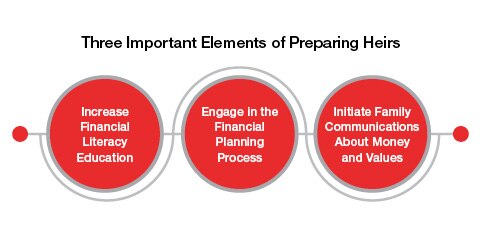Considerations for the Great Wealth Transfer – Part One

The Key Wealth Institute is a team of highly experienced professionals representing various disciplines within wealth management who are dedicated to delivering timely insights and practical advice. From strategies designed to better manage your wealth, to guidance to help you better understand the world impacting your wealth, Key Wealth Institute provides proactive insights needed to navigate your financial journey.

The three important elements of preparing heirs are:
- Increase financial literacy education
- Engage in the financial planning process
- Initiate family communications about money and values
Increase Financial Literacy
Increased financial literacy through financial education at all phases of life on a range of topics will contribute to more effective wealth transfer. The president and CEO of the National Endowment for Financial Education (NEFE), Billy Hensley, Ph.D., acknowledges that “feeling confident in making optimal financial decisions can be difficult to attain and it can take time but, undoubtedly, gaining as much information and knowledge as possible can directly correlate to improving an individual’s confidence level.”2
Do It Yourself
You can promote opportunities to learn as a family. For example, play one of the 14 Money Smart games provided by the Federal Deposit Insurance Corporation (FDIC) on its Money Smart website with your children or grandchildren https://playmoneysmart.fdic.gov/game. The NEFE also provides two free publications, “40 Money Management Tips Every College Student should Know,” and “Your Spending, Your Saving, Your Future,” an all-in-one guide that addresses financial goal setting and other topics.3 We also provide a short list of activities for families at different phases of life at the end of this article.
Visit the Key Financial Wellness Center
The Key Financial Wellness Center is available to everyone through key.com. It provides a series of financial wellness articles on a range of topics and offers an opportunity to schedule a Financial Wellness Review.
Select Clients May Use EverFi Education Service
Select clients can ask their advisor to enroll their family in an educational service provided through EverFi. This value-added service provides web-based interactive courses, from grade school to high school, college and into adulthood. EverFi courses are designed to help you and your family feel more confident about managing money.
The Key Private Bank Wealth Management page on our website, key.com provides a wide range of articles to help you grow, preserve, protect, and transfer your wealth.
Engage in the Financial Planning Process
Comprehensive, holistic wealth planning helps you project how much wealth you are leaving your heirs after you have sustained your desired lifestyle and accounted for any difficult situations such as a prolonged down market and/or a significant long-term care expense. The planning process also helps model different wealth protection and tax reduction strategies. Quantifying how much your family may inherit in a best- and in a worst-case scenario helps you add meaningful detail to how you imagine they will react when they receive the funds. If you do not have a plan, contact your advisor to begin the process.
Once your plan is in place, your advisor may be able to help your children develop their own financial plan. Going through the planning process will help them apply what they have learned through your financial education efforts, and it will encourage a sense of financial independence. They will know how much they can accomplish on their own rather than relying on family wealth.
Another consideration is the planning process may provide confidence to give or give more to children while you are living, so you can guide and enjoy the positive impact it has on their lives rather than waiting for all your wealth to transfer at your death. Giving while you are living will also help initiate family communication about money and values, a topic we will discuss in Part Two of this series.
The Bottom Line
Being unprepared for an inheritance may have a significant impact on your child or grandchild. At the beginning of this article, we asked you to imagine the day your children or grandchildren receive their inheritance. We hope you can picture how increasing financial literacy and engaging in the financial planning processes can help make your Great Wealth Transfer truly great.
Next
The Great Wealth Transfer Part Two
Our discussion on how to prepare for the Great Wealth Transfer will continue in a separate article that suggests ways to initiate family communication about money and values.
For more information, please contact your advisor.

About Renee Porter-Medley
Renee is a highly experienced professional who works closely with the relationship team to understand a client’s personal situation and goals and develop an integrated, customized set of strategies to help them reach their objectives. She earned a Bachelor of Arts in International Studies with a major in Finance from the University of Michigan, and a Master of Professional Studies in Organization Development from Penn State University. Renee an active member of Kingdom Advisors, the Planned Giving Council, and the Purposeful Planning Institute. Her professional development for the past 10 years has been focused on helping families flourish by leveraging financial capital to develop their human, social, intellectual, and spiritual capital.